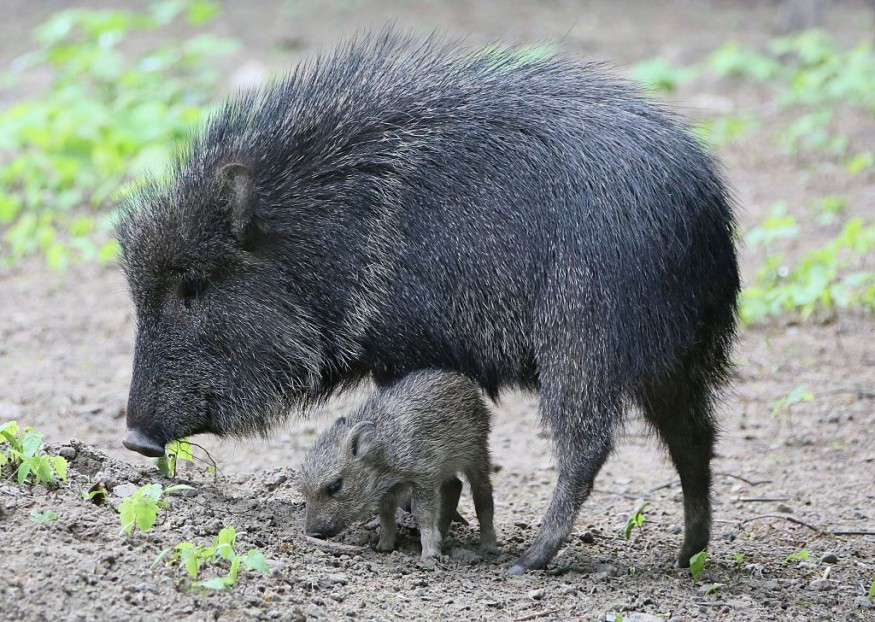
The pig-like animals, dubbed "The Tasmanian Devil" by the Seven Canyons manager, plowed through a golf course in Arizona while searching for earthworms.
Moves Like 'The Tasmanian Devil'
At nightfall in a stunning US golf club, eerie sounds of growling, clacking teeth, and hoofbeats echo off red-rock canyon walls. When the Arizona sun rises over Seven Canyons, the 7,000-yard course reveals torn-up fairways, resembling open wounds, thanks to Javelina, pig-like creatures with destructive teeth.
These small but chaotic animals have become a viral sensation in Sedona, described by the club's general manager as "The Tasmanian Devil." They wreak havoc, with turf scattered and intense grunting and fighting, leaving a disturbing scene in their wake.
Javelina: Pig-Like Creatures
Javelina, also known as a collared peccary or musk hogs, are not pigs but members of the peccary family. They migrated from South America to Arizona and other Southwestern US states. These creatures are about three to four feet long, 19 inches tall, weighing 40 to 60 pounds, with a lifespan of around seven and a half years. They primarily feed on cacti, bulbs, and other plants, but also scavenge garbage, insects, and earthworms.
Seven Canyons, nestled near the Vermilion Cliffs and the Coconino National Forest, is a tempting buffet for javelina due to its lush fairways and water hazards.
Javelina, active mainly after dark, often roam in herds of 25 to 35, digging up turf in search of earthworms. A dry summer exacerbated the situation, as Dave Bisbee, the club's manager, faces the challenge of repairing the damage. In Arizona, it's illegal to harm or kill a javelina, so removal is a last resort.
Preventing their presence through fences and not feeding them is advised. Despite staff efforts, the course's condition may remain unchanged until spring. As temperatures drop, worms burrow deeper, out of the javelina's reach, offering hope that the worst of the assault is over, but financial scars will linger.
Costly Scars vs. Viral Fame
Bisbee estimates that the club will have spent $150,000 to $300,000 on labor costs, along with an additional $50,000 to $75,000 on seed, turf growth blankets, and restoration equipment before the javelinas finally move on.
Despite the chaos, there's been a silver lining - viral fame.
Come along with me on my carnage (I mean course) check this morning. What should be one of the most beautiful golf courses in the country is being destroyed by herds of javelina. If anyone has a contact in AZ state govt that can help us find a solution please pass it along. pic.twitter.com/XftywHtVCf
— Em Casey (@emcaseyturf) October 22, 2023
The course's assistant superintendent, Emily Casey, shared a 30-second video of the javelinas causing havoc, and it quickly gained attention. Initially, the video had 1.4 million views, but three weeks later, it reached 32.9 million views and still counting.
The unexpected online attention has left Bisbee wondering why, among all the wildlife at Seven Canyons, it's the small pig-like javelinas that have captured the internet's fascination.
He humorously remarked that they should have discovered this earlier and done it every week. The viral exposure has put the golf course on the map for millions of people who didn't know about Seven Canyons and increased awareness about javelinas.
About Seven Canyons
Seven Canyons, a par-72 golf course, spans 7,000 scenic yards amid red-rock formations, ancient trees, and arroyos. Surrounded by vermillion cliffs in the Coconino National Forest, it's strategically designed by Tom Weiskopf for a rewarding golf experience. Suitable for all players, it offers 300 sunny days a year, ensuring year-round enjoyment in a picturesque setting.
Related Article : Feral Pigs in Germany Radioactive from 20th Century Nuclear Weapons Plus Chernobyl Explosion, Study Says
© 2025 NatureWorldNews.com All rights reserved. Do not reproduce without permission.





